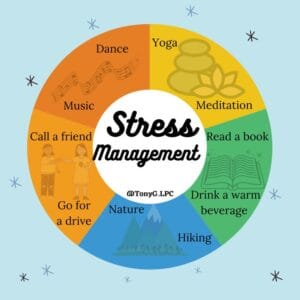Stress. It’s a word we hear daily, a feeling that lingers in our minds, and a force that can, if left unchecked, take over our lives. But here’s the truth: stress doesn’t have to control you. With the right tools and strategies, you can transform stress from an overwhelming adversary into a manageable part of life.
This blog isn’t just about the theory of stress management—it’s a practical roadmap to help you regain control, find calm, and build resilience in the face of life’s inevitable challenges.
Table of Contents
What is Stress, Really?
Stress is your body’s natural response to a perceived threat. Picture yourself face-to-face with a lion in the wild: Your heart races, your palms sweat, and adrenaline surges to prepare you to fight or flee.
Now replace the lion with a looming deadline, a difficult conversation, or the chaos of a morning commute. Your body reacts the same way. In small doses, stress can sharpen your focus and boost performance. But when stress becomes chronic—the kind that lingers day after day—it can drain your energy, disrupt your health, and cloud your judgment.
The Many Faces of Stress
Stress doesn’t always announce itself in dramatic ways. Often, it sneaks in under the radar and shows up as:
- Physical Symptoms: Headaches, fatigue, muscle tension, or an upset stomach.
- Emotional Reactions: Irritability, anxiety, or feelings of being overwhelmed.
- Behavioral Changes: Procrastination, overeating, or withdrawing from loved ones.
Recognizing these signs is the first step toward managing stress before it becomes unmanageable.
The Science of Stress: Why We Feel It
Stress triggers a cascade of hormones, including cortisol and adrenaline, designed to help you respond to challenges. In the short term, this “fight or flight” response is essential for survival. But when stress becomes prolonged, this system stays on for too long and starts to take a toll on both your physical and mental health.
Chronic stress has been linked to:
- Sleep disturbances
- Weakened immune function
- High blood pressure and heart disease
- Anxiety and depression
Understanding how stress impacts your body and mind is crucial to regaining balance and preventing burnout.
Strategies for Mastering Stress
The good news? Stress is manageable. Here are some proven strategies to help you stay in control and reduce its negative impact:
1. Breathe Your Way to Calm
Your breath is one of the most powerful tools you have. When stress strikes, try deep breathing:
- Inhale for 4 counts
- Hold your breath for 4 counts
- Exhale for 6 counts
This simple exercise signals your brain to relax, slowing your heart rate and calming your mind.
2. Embrace Movement
Exercise isn’t just for physical health—it’s one of the best ways to relieve stress. Whether it’s yoga, a brisk walk, or dancing in your living room, movement releases endorphins, your body’s natural mood boosters.
3. Set Boundaries
Learning to say “no” is a crucial skill. Protect your time and energy by prioritizing tasks and avoiding overcommitment. Setting boundaries helps you avoid feeling overwhelmed and ensures you have time for rest and self-care.
4. Practice Mindfulness
Mindfulness keeps you anchored in the present moment, helping you break free from the cycle of stress and worry. Techniques like meditation, journaling, or simply savoring a cup of coffee can shift your perspective and calm your mind.
5. Connect with Others
Social support is one of the most powerful buffers against stress. Whether it’s talking to a friend, joining a support group, or spending quality time with loved ones, sharing your feelings can lighten your emotional load and provide comfort.
The Role of Self-Care in Stress Management
Stress thrives in a depleted body and mind. That’s why self-care isn’t selfish—it’s essential. Make time for activities that nourish you, inside and out:
- Quality Sleep: Aim for 7-8 hours per night to help your body and mind recharge.
- Healthy Eating: Fuel your body with balanced meals and plenty of water to keep your energy up.
- Engage in Hobbies: Spend time doing things you enjoy, whether it’s painting, gardening, or playing an instrument. Engaging in fun activities can provide a sense of purpose and relaxation.
When Stress Becomes Overwhelming
Sometimes, stress can feel like too much to handle on your own. If you’re experiencing persistent feelings of helplessness, burnout, or physical symptoms that won’t go away, it’s important to seek help.
Talking to a therapist, counselor, or other professional can provide the support, tools, and guidance you need to better navigate your stress.
Your Stress Isn’t the Enemy
Stress doesn’t have to be the villain in your story. When managed effectively, stress can motivate, energize, and even help you grow. The key is learning how to respond, rather than react, to stress.
Start small. Take a deep breath. Make a simple change. Offer yourself a kind word. Over time, these small actions will add up, helping you create a life that feels balanced, calm, and full of meaning.



